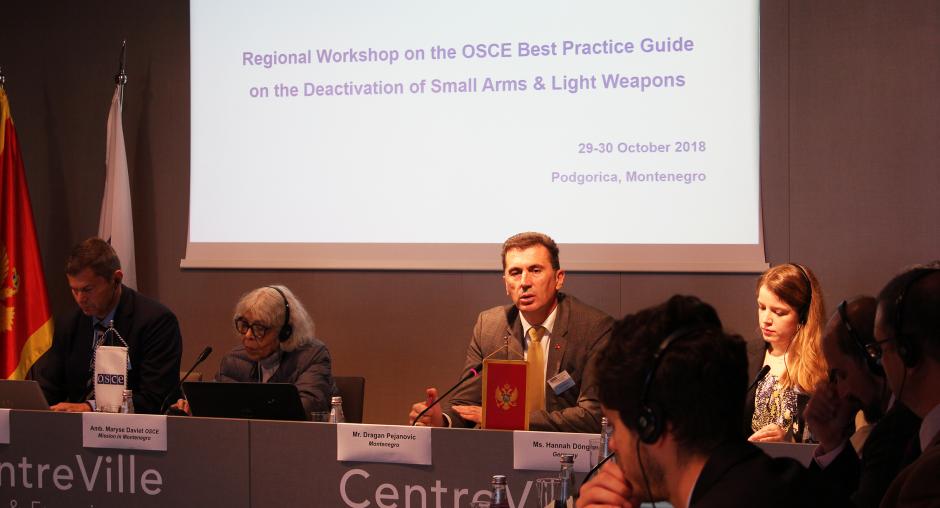Deactivation of Small Arms and Light Weapons in focus of the OSCE Workshop in Montenegro

Montenegro has made substantial progress in the last decade in reducing its stockpiles of arms and ammunition, thereby cutting the risks they pose to citizens and the environment, said the Head of the OSCE Mission to Montenegro Maryse Daviet as she opened a two-day regional workshop in Podgorica on 29 October 2018 on the deactivation of small arms and light weapons (SALW) in line with the international standards.
Around 50 participants from South-Eastern Europe attended the workshop, organized by the OSCE Conflict Prevention Centre, the OSCE Mission to Montenegro and the Montenegrin Ministries of Interior and Defence, which also focused on approaches and procedures to combat the diversion and illegal sales of SALW.
“This July in London, Montenegro, together with other members of the Western Balkans, pledged to adopt by 2024 the Roadmap for a sustainable solution to the illegal possession, misuse and trafficking of SALW, and their ammunition, in the framework of the Franco-German initiative,” said Ambassador Daviet, adding that the OSCE is ready to support Montenegro in this endeavour.
The workshop focused on two goals of the Roadmap: to ensure that arms control legislation is fully harmonized with the EU regulatory framework by 2023, and that the collection and legalization of SALW is carried out by using deactivation procedures according to international standards.
The head of the Forum for Security Co-operation Support Section within the OSCE’s Conflict Prevention Centre, Robin Mossinkoff, said that the Organization is a frontrunner in trying to address the issue of deactivation in practice.
“The stronger the laws on deactivation are, and the clearer deactivation procedures and the subsequent enforcement of these in practice are, the more useful this will be for all stakeholders dealing with weapons of any sort,” he said.
The State Secretary of the Montenegrin Interior Ministry, Dragan Pejanović, recalled that following the terrorist attacks in Paris in December 2015 the European Commission proposed revisions to the European Union’s Firearms Directive.
“New rules increase the security of citizens, while hunters, sports shooters and collectors can still buy weapons, under strict conditions,” said Pejanović.
Representing the German Federal Foreign Office, Hannah Dönges said that the Roadmap, drawn up as part of the Franco-German joint initiative should ensure that transfers of illicit SALW and ammunition and will not stand in the way of EU accession.
“Specific goals should be achieved by 2024 and the OSCE is a core partner in working towards achieving goals,” she said. The workshop also supports countries of the region in implementing their national action plans on illicit firearms trafficking and comprehensive SALW control.
